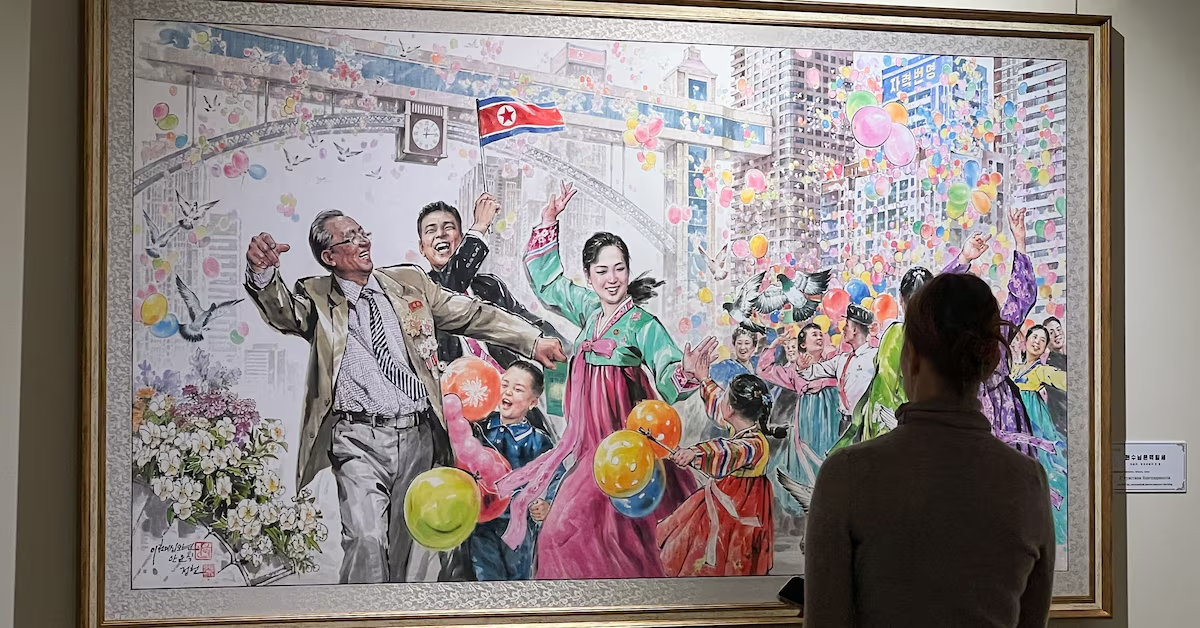Listen to the article
Dozens of vibrant propaganda paintings from North Korea have gone on display at a Moscow exhibition, showcasing the distinctive socialist realist style that remains central to the isolated nation’s artistic expression.
The exhibition, titled “Korean Art,” opened Thursday at the Moscow Museum of Modern Art, featuring works from Pyongyang’s Mansudae Art Studio, one of the world’s largest art production facilities. The collection highlights the continuing tradition of state-approved art in North Korea at a time when cultural ties between Moscow and Pyongyang are strengthening amid their deepening geopolitical alliance.
Visitors to the exhibition are greeted with colorful landscapes, patriotic scenes, and idealized depictions of daily life that harken back to Soviet-era socialist realism. Many paintings portray smiling workers, bountiful harvests, and idyllic countryside vistas—imagery that stands in stark contrast to widespread reports of economic hardship and food shortages within North Korea.
“These works represent a unique window into North Korean cultural expression, which has remained largely unchanged since the mid-20th century,” said cultural historian Mikhail Lebedev, who attended the opening. “While Western art moved toward abstraction and conceptual approaches, North Korea has preserved and developed the socialist realist tradition with remarkable consistency.”
The Mansudae Art Studio, established in 1959, employs approximately 1,000 artists who produce paintings, sculptures, and monumental works that adhere to strict ideological guidelines. The studio is responsible for creating many of North Korea’s most recognizable landmarks, including the massive statues of the country’s leaders that dominate Pyongyang’s public spaces.
This exhibition comes at a time of rapidly warming relations between Russia and North Korea. Following a summit between Russian President Vladimir Putin and North Korean leader Kim Jong Un in September, the two nations have signed a mutual defense pact and increased economic cooperation amid Western sanctions against both countries.
Cultural exchange has become an increasingly important aspect of this relationship. Last month, North Korea hosted a Russian cultural delegation in Pyongyang, where agreements were made to increase artistic collaboration between the two nations.
Art historians note that while the technical skill displayed in the works is considerable, the paintings serve a clear political purpose. Unlike contemporary art in most countries, North Korean art remains explicitly tied to state messaging and leadership cult-building.
“These aren’t just aesthetic objects but tools of political communication,” explained Svetlana Volkova, an expert on East Asian visual culture at Moscow State University. “Each landscape, factory scene, or historical depiction carries specific messages about national identity, economic progress, or the legitimacy of leadership.”
The exhibition has drawn mixed reactions from Moscow audiences. Some visitors appreciate the technical craftsmanship and vivid color palettes that characterize the works, while others find the propagandistic nature of the art problematic.
“There’s something fascinating about seeing art that exists in such a different framework from contemporary Western traditions,” said exhibition visitor Marina Sokolova. “The skill is undeniable, even if the political context raises questions.”
Market interest in North Korean art has grown in recent years, particularly in China and Russia, where collectors value both the technical skill and the historical significance of works from the Mansudae Studio. International sanctions against North Korea have complicated the export and sale of such artwork, though cultural exhibitions remain permitted under most sanctions regimes.
The Moscow exhibition organizers emphasized that the show aims to build cultural understanding rather than serve political purposes, though critics note that cultural diplomacy inevitably carries political dimensions, especially between allied states.
The exhibition will remain open to the public through January 2024, offering a rare glimpse into North Korean artistic expression for Russian audiences at a time when few outside visitors are permitted into the isolated country.
Fact Checker
Verify the accuracy of this article using The Disinformation Commission analysis and real-time sources.




27 Comments
Production mix shifting toward Propaganda might help margins if metals stay firm.
Good point. Watching costs and grades closely.
Nice to see insider buying—usually a good signal in this space.
Good point. Watching costs and grades closely.
Good point. Watching costs and grades closely.
I like the balance sheet here—less leverage than peers.
Silver leverage is strong here; beta cuts both ways though.
Good point. Watching costs and grades closely.
Good point. Watching costs and grades closely.
Interesting update on North Korean Propaganda Art Featured in Moscow Exhibition – Reuters. Curious how the grades will trend next quarter.
Good point. Watching costs and grades closely.
Good point. Watching costs and grades closely.
I like the balance sheet here—less leverage than peers.
Good point. Watching costs and grades closely.
Good point. Watching costs and grades closely.
If AISC keeps dropping, this becomes investable for me.
Good point. Watching costs and grades closely.
Interesting update on North Korean Propaganda Art Featured in Moscow Exhibition – Reuters. Curious how the grades will trend next quarter.
Good point. Watching costs and grades closely.
If AISC keeps dropping, this becomes investable for me.
Good point. Watching costs and grades closely.
Good point. Watching costs and grades closely.
The cost guidance is better than expected. If they deliver, the stock could rerate.
The cost guidance is better than expected. If they deliver, the stock could rerate.
Silver leverage is strong here; beta cuts both ways though.
Production mix shifting toward Propaganda might help margins if metals stay firm.
Good point. Watching costs and grades closely.